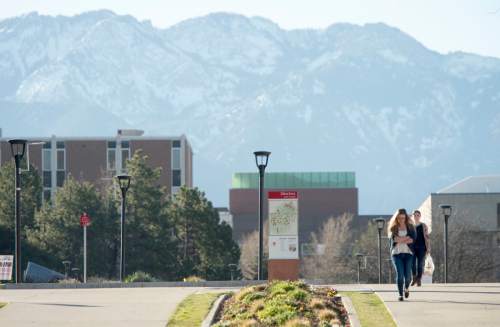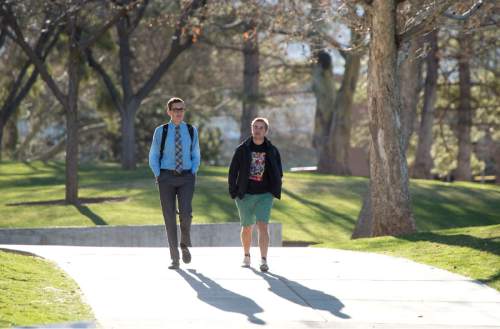This is an archived article that was published on sltrib.com in 2015, and information in the article may be outdated. It is provided only for personal research purposes and may not be reprinted.
Utah students will pay slightly more for college next year. And undergraduates at the University of Utah will fork over a bit more than most.
Tuition for the 2015-2016 school year is set to rise by about the same cost as an iPhone upgrade, a new pair of Jordans or a second-hand textbook — somewhere between $90 and $250, depending on the college and credit load.
The cost rises more for students from other states or others who take more than 15 credits each semester.
The state Board of Regents, which oversees Utah's eight public colleges, approved the baseline increase of 3.06 percent on Friday — down from 4 percent last year and the lowest average increase since 1999.
"It's really driven out concern for students and wanting to make sure we can keep college as affordable as possible," said higher education commissioner David Buhler.
He credits an uptick in legislative funding and internal cost-cutting by administrators for keeping tuition costs down.
Buhler and other higher education administrators hope the smaller tuition bump will help more students graduate on time and with less debt.
They note that Utah has the 3rd-lowest tuition nationwide, according to The College Board.
"I'm hoping this kind of range will be the norm," Buhler said. "You can't predict the future, but it would be nice if you could keep it at this level or even less. From a student perspective, I know it would be nice if it didn't go up at all."
Adam Hawker, a 21-year-old sophomore at the U., said he'll likely hold off on adding to his movie collection, make more meals at home and maybe get a second job to meet the higher tuition costs.
"It's just gonna be budgeting money more wisely" and maybe getting a second job, said Hawker, who works about 20 hours a week at a market research firm.
Even though his tuition payments are set to climb only slightly, Hawker, who wants to be an accountant, spends $300-$500 a semester on books for his pre-business courses.
The U. is the only Utah school that elected to tack on an additional fee, upping the increase to 3.5 percent.
The yearly cost is set to rise to $7,130 from this year's $6,889.
The additional half a percent will help bolster academic advising, a "critical" move to help students graduate within a six-year window, said Cathy Anderson, the university's associate vice president of budget and planning. The money also will pay for more online classes and graduate research positions.
"We're always walking this balance of quality of education and keeping student costs low," Anderson said.
Many Utah families are balancing multiple college students and their varying tuition increases.
Hawker's mother Suzanne is a Salt Lake City violinist and got a bachelor's degree from the U. in early 1980s. Her freshman year, tuition cost about $1,200 a year.
Tuition has doubled since her eldest son, now 27, entered the university 10 years ago. To cope with growing semesterly payments, the family often opts for barbecues at home instead of dinners at restaurants and has taken fewer vacations in recent years.
"We're just a little more careful everywhere," said the mother of five.
As Adam's 24-year-old brother prepares to graduate from the U. in May and a 17-year-old brother who plans to attend the U. next year, Hawker's concern has grown.
"We're U. fans and we want to stay U. fans," she said, adding that she hopes her grandchildren will be able to afford the school.
Michele Mattsson, chairwoman of the University of Utah board of trustees, said holding the additional U. tuition spike to half a percent was crucial.
"I couldn't have supported any more than that," she said.
Students in recent years have at times shouldered stiff increases of 8 or 9 cents per tuition dollar.
"I just don't want these students to be burdened with debt," Mattsson said. "I just see a lot of kids for whom it's hard to pay for college, and it's essential for what they want to do."
Like Adam Hawker, some students are driven, but do not qualify for scholarships, she noted.
"Those are the ones I worry about a lot," she said. "But I do think [the lower tuition bump] is a good trend this year. I think we've made a turn for the better."
Twitter: @anniebknox





